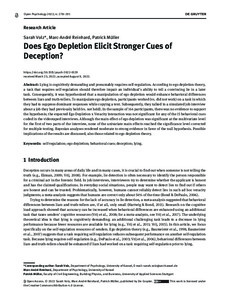Does Ego Depletion Elicit Stronger Cues of Deception?
| dc.date.accessioned | 2023-01-18T16:10:36Z | |
| dc.date.available | 2023-01-18T16:10:36Z | |
| dc.date.issued | 2022-12-27 | |
| dc.identifier | doi:10.17170/kobra-202301187402 | |
| dc.identifier.uri | http://hdl.handle.net/123456789/14374 | |
| dc.description.sponsorship | Gefördert durch den Publikationsfonds der Universität Kassel | |
| dc.language.iso | eng | |
| dc.rights | Namensnennung 4.0 International | * |
| dc.rights.uri | http://creativecommons.org/licenses/by/4.0/ | * |
| dc.subject | Self-regulation | eng |
| dc.subject | Ego depletion | eng |
| dc.subject | Behavioral cues | eng |
| dc.subject | Deception | eng |
| dc.subject | Lying | eng |
| dc.subject.ddc | 150 | |
| dc.title | Does Ego Depletion Elicit Stronger Cues of Deception? | eng |
| dc.type | Aufsatz | |
| dcterms.abstract | Lying is cognitively demanding and presumably requires self-regulation. According to ego depletion theory, a task that requires self-regulation should therefore impair an individual’s ability to tell a convincing lie in a later task. Consequently, it was hypothesized that a manipulation of ego depletion would enhance behavioral differences between liars and truth-tellers. To manipulate ego depletion, participants worked (vs. did not work) on a task in which they had to suppress dominant responses while copying a text. Subsequently, they talked in a simulated job interview about a job they had previously held (vs. not held). In the sample of 164 participants, there was no evidence to support the hypothesis; the expected Ego Depletion x Veracity interaction was not significant for any of the 15 behavioral cues coded in the videotaped interviews. Although the main effect of ego depletion was significant at the multivariate level for the first of two parts of the interview, none of the univariate main effects reached the significance level corrected for multiple testing. Bayesian analyses rendered moderate to strong evidence in favor of the null hypothesis. Possible implications of the results are discussed, also those related to ego depletion theory. | eng |
| dcterms.accessRights | open access | |
| dcterms.creator | Volz, Sarah | |
| dcterms.creator | Reinhard, Marc-André | |
| dcterms.creator | Müller, Patrick | |
| dc.relation.doi | doi:10.1515/psych-2022-0129 | |
| dc.subject.swd | Lüge | ger |
| dc.subject.swd | Selbstkontrolle | ger |
| dc.subject.swd | Erschöpfung | ger |
| dc.subject.swd | Verhaltensmuster | ger |
| dc.type.version | publishedVersion | |
| dcterms.source.identifier | eissn:2543-8883 | |
| dcterms.source.issue | Heft 1 | |
| dcterms.source.journal | Open Psychology | eng |
| dcterms.source.pageinfo | 278-291 | |
| dcterms.source.volume | Band 4 | |
| kup.iskup | false |
Dateien zu dieser Ressource
Das Dokument erscheint in:
-
Artikel [1106]


